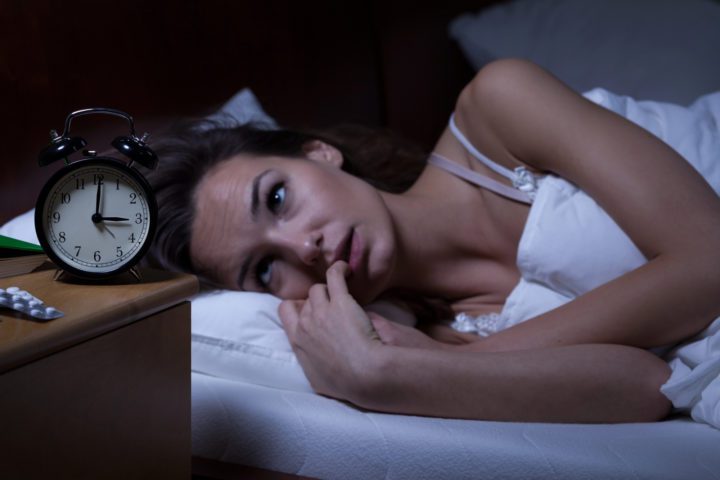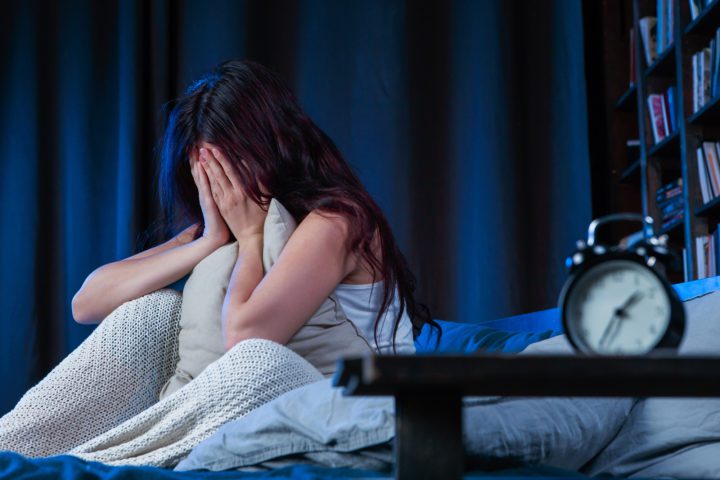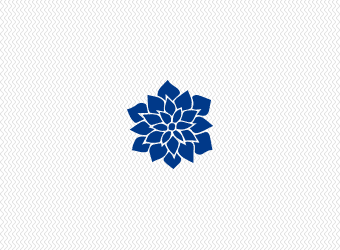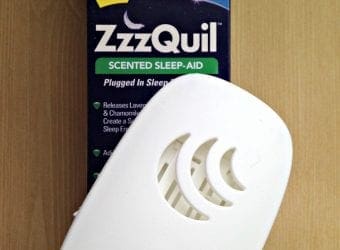How to Help Insomnia During Period
Written by a chronic insomniac herself, this guide focuses on both natural and chemical techniques to help you fall asleep faster and stay asleep. Insomnia (from the etymological Latin “in” meaning “not”, and “Somnus” meaning “sleep”) is most often defined by an individual's report of difficulty falling and staying asleep. Whether you're suffering from acute or chronic insomnia related to your period or PMS, there are both traditional and more experimental steps you can take to help alleviate the stress and sleep better now during menstruation. We hope you find this How to Help Insomnia During Period post valuable.
How to Help Insomnia During Period

Image from Depositphotos
How to Help Insomnia During Period
Consistency
First the classic advice: keep consistent waking/sleeping hours. Your body likes rhythm and this is reflected in the body's well-known circadian rhythm cycle, which adjusts hormones depending on the time of day. Try to wake up consistently at the same time every morning and go to bed at roughly the same time every night. This will help your body know when it's time to sleep.
Sometimes, such as if you're working late, this isn’t a realistic goal. If you get to bed a few hours later than normal, adjust your alarm clock to get the minimum amount of sleep your body needs. From experience, I know my minimum time is 8 hours. (Depending on the person, it can vary to 6 to 10 hours.) So if I go to bed at 1:30 AM, I give myself a half hour to fall asleep, and I set my alarm for 10 AM. If I wake up in the middle of the night, I’ll adjust my alarm clock to let my body get enough sleep if I have the time. Try to go to bed at the normal time the next night.
How to Increase REM and Deep Sleep
Comfort
Make sure you’re comfortable. Is the bed too firm? Get a foam pad. Too hot? Dish out the money for a fan or A/C. Sleep is worth it. The body naturally cools down when falling asleep, so try to keep it on the cooler side when you sleep, but have a soft blanket nearby in case you get chilly. A cool bath or shower before you hit the sack can also help regulate body temperature.
Lighting
Turn down the lights for an hour before you fall asleep. Artificial light can confuse your nature-based brain and wake you up. Use a small desk lamp to illuminate rather than full lighting. I got into a habit of doing everything by candlelight in my night-time ritual. Using scented candles adds the double bonus of aromatherapy. But if you want the safer option, glass or plastic tea light candles last a long time and are relatively cheap.
Why Do People Have a Hard Time Going To Bed?
How to Help Insomnia During Period
Light Exercises
Do some light stretching to relax your muscles. There are a lot of good instructional videos available for free on YouTube. Tensing up a muscle group for 5 seconds at a time and then releasing it is another good technique to help ease tension in the body.
Calm Your Thoughts
To calm whirlwind thoughts, close your eyes, and focus on the act of breathing in and out. This is a very common meditation technique enhanced by visualizing your breath as a white light. Imagine this white light as collecting the stress that you rid from your body at the exhale. Follow some guided breathing exercises, also available for free on YouTube.
Effects of Periods on Body
Listen to Music
Delta-wave Inducing music. This is another New Age technique I discovered on YouTube. The music incorporates tones of alternating frequency called binaural beats that are supposed to stimulate certain waves in the brain. I find it mildly effective. I normally start with an alpha wave song and then move on to the more relaxing delta waves. If you find the binaural beats annoying, switch it out for some light piano or other relaxing music.
What to Eat
Eat complex carbohydrates. Examples of complex carbs include wholegrain bread, potatoes, and beans. It more takes energy for your body to break these foods down than simple sugars and this naturally makes people tired. I like to eat a whole wheat bagel with peanut butter and drink milk with it. Chamomile tea is also a soothing accompanying drink.

Image from Depositphotos
How to Help Insomnia During Period
Medication
Sleep medications. There are two major over-the-counter sleep aids available on the market. They are sold by the names diphenhydramine hydrochloride (Benadryl) and doxylamine succinate (Unisom Tablets, although a diphenhydramine Unisom Gel Caplet is also on the market). Look on the back of the box of sleeping tablets to see what the active ingredient is.
There’s also melatonin, a hormone the body produces during sleep, which can be found in the vitamin and supplement aisle and is known to be effective in correcting jet lag. But the FDA has not done long-term use studies on it, so I’d be careful and not take it every night.
Get prescription medication only as a last resort. Even then, ask your doctor to start with the ones that are the least habit-forming.
9 Tips for Talking to a Girl about Her Period
Massage
Massage yourself. Nothing eases tension like a relaxing massage. If you don't have a partner with willing hands, it's easy to do it yourself. Easy and effective spots to massage yourself include the feet and the neck.
Sleep Study
Sleep studies. Performed in a sleep lab by a healthcare professional, sleep studies can be very expensive. They can cost up to several thousand dollars and insurance might not cover them. But if you think you suffer from sleep apnea, often characterized by a choking snore, a sleep specialist may be able to help.
How to Help Insomnia During Period
Insomnia may be a symptom of a greater medical issue, so if you have insomnia that lasts longer than a couple of weeks, contact your doctor. We hope you find this How to Help Insomnia During Period post valuable. Good luck!

What is a Facelift and How Does It Work?







